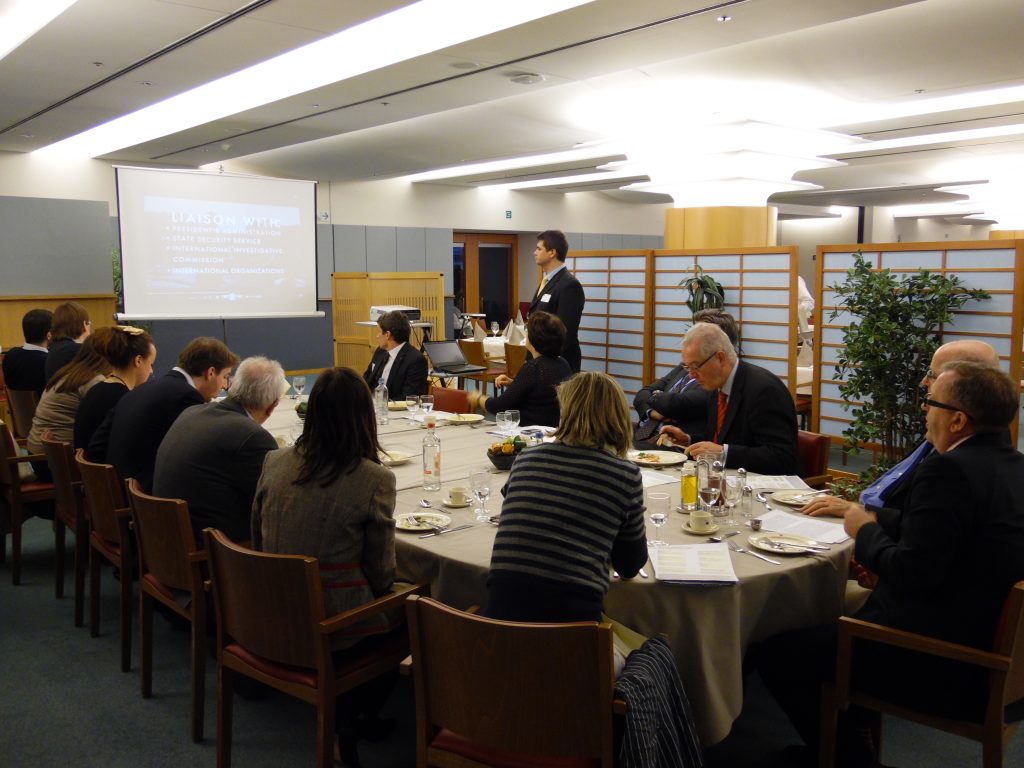Kyiv, December 9, 2014. Russia spends hundreds of millions of dollars on propaganda every year, criticizing Ukraine, creating myths about its citizens and building parallel reality for the audience both at home and abroad. Such statements were released by the delegation of Ukraine Crisis Media Center (UCMC) Vilyen Pidgornyy and Max Savanevsky during the Fighting Disinformation, A View From Ukraine conference (API Hour) in Brussels, Belgium. The conference was one in the series of events in Brussels organized by the UCMC and EU-Ukraine Business Council through the support of International Renaissance Foundation. In addition, the UCMC representatives spoke at the Role of Civil Society of Belgium in Promoting Peace in Ukraine open lecture at Vesalius College, participated in Ukraine’s Post-Election Political Landscape event at the European Policy Center and gave presentation at Ukraine Fighting the Information War event attended by the EP members at the European Parliament in Brussels.
Next year the combined budget of the Russian media outlets RT and Sputnik is expected to increase over USD 500 million while the budget of the largest broadcasting corporation in the world BBC is to remain way below the USD 400 million margin, mentioned NATO spokesperson Oana Lungescu who was a speaker at the API Hour together with API president Ann Cahill and Oleksii Omelianchuk, Democratic Alliance party representative. This fact alone may expose the scale of Russia’s interest in becoming a leader in broadcasting news the way they want others to see them and potentially influencing the audience worldwide.
The delegates also discussed how to fight the Russian disinformation as well as identified the goals and ways of the Kremlin propaganda machine. NATO adheres to the principles of freedom, democracy, rule of law and human rights, said Lungescu. Therefore, it doesn’t respond to propaganda with antipropaganda, she concluded. Ukraine shares similar principles and values, noted UCMC delegates. “UCMC is a window of Ukraine into European, American, and Canadian media environment, we often communicate with Western media,” explained Max Savanevsky in his interview with Radio Svoboda. “We also help Ukrainian authorities build a proper communication strategy, normal patterns of communication, establish contacts with the Western media,” he emphasized.
It’s been a year since Ukraine has been on the front pages of the world media because of the political crisis, public unrest, gross human rights violations by the former Ukrainian government and the Euromaidan demonstrations followed by the Revolution of Dignity. Since then a lot of changes have taken place including the ousting of the former President Yanukovych, electing new president, new parliament and appointing the new Cabinet. On the other hand Ukraine has been going through hostile occupation of Crimea by the Russian army, development of separatist movement in the east of Ukraine triggering civil unrest and terrorist attacks fueled by the mercenary and weapons supply from the RF. Ukrainian government was able to respond to military invasion by aligning the forces of the army together with volunteer battalions through Antiterrorist operation (ATO) in Donbas – Luhansk and Donetsk regions of Ukraine. Nevertheless, the European integration has been the goal of Ukraine all along. “Almost 90 percent of voters voted for the European vector of Ukraine. Continued political, economic, diplomatic and military support from the Western partners is an important guarantee that Ukraine will soon be able to reach a new level and fully qualify for membership in NATO and the EU,” elaborated Oleksii Omelianchuk.
Ukraine Crisis Media Center (UCMC) an independent media platform founded in March 2014 by the leading Ukrainian experts in the field of international relations, communications and public relations, who agreed to provide their expertise and donate their time to help Ukraine get stronger voice in the global dialogue about the latest developments. Center is not funded by any political force and is exclusively public initiative.

